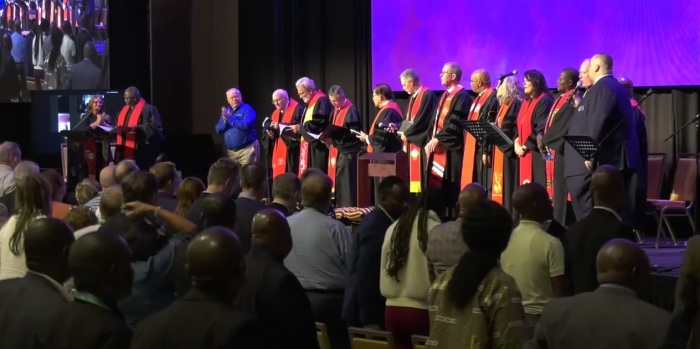
The leadership of the Global Methodist Church has condemned the killing of three members of the United Methodist Church in Nigeria amid reports that GMC members were responsible.
In a statement emailed to The Christian Post on Thursday, the GMC Assembly of Bishops responded to reports that there had been violence between groups in Munga Dosa, Nigeria, resulting in fatalities and several homes being burned down.
"We are deeply grieved by the loss of life and the devastation that has occurred," said the assembly. "We unequivocally decry the use of violence in any form and call on all people, Global Methodists and United Methodists alike, to act as agents of peace."
"We urge the church and the global community to pray fervently for those enduring unimaginable suffering, for justice to be served to those responsible for these acts, and for peace to be restored in Munga Dosa."
The GMC says there is "significant uncertainty surrounding the events" and warned "against accepting unverified accounts or accusations circulating on social media."
Earlier this week, UM News reported that violence broke out in Nigeria between members of the UMC and the GMC after a Sunday gathering at Bwoi United Methodist Church in Bunkabu, a conflict that led to the torching of nearby huts and the death of two young children ages 2 and 4. A 27-year-old killed in the confrontation has been identified as UMC church lay leader Elisha Masoyi.
The altercation came after the state government shut down both UMC and GMC churches in the area amid a conflict that caused instability and disrupted peace, according to UM News.
According to the church leaders, the violence may have stemmed from a local decades-old feud between families, with ongoing disputes between the UMC and the GMC being one factor.
Bishops John Pena Auta and Scott Jones, who are part of the four annual conferences of the GMC in Nigeria, issued a joint statement saying they "deplore all forms of violence being practiced."
"This is especially wrong when the persons involved are members of Methodist churches. We call upon all persons to practice love, mutual understanding, and respect for differences," Auta and Jones stated.
UMC Bishop-elect Ande Emmanuel and Nigeria Lead Bishop John Schol condemned the violence, saying that they were "outraged that such an atrocity would occur among Christians, especially brothers and sisters who were once part of the same Methodist family."
"We further urge GMC members, at all levels, to put an immediate end to the violence and refrain from disseminating misinformation that fuels fear and disdain that can lead to violence," they stated, as quoted by UM News.
"Likewise, we call our United Methodist members to be guided by integrity and respectful while working towards maintaining peace."
Following decades of debate, the UMC General Conference voted earlier this year to remove church rules banning the blessing of same-sex unions, the ordination of noncelibate homosexuals and the funding of LGBT advocacy groups.
Approximately 7,500 congregations have departed from the UMC over the sexual ethics debate in recent years, with thousands of them joining the theologically conservative GMC.
In Nigeria, not only is same-sex marriage and the sexual act of homosexuality illegal, but the government also prohibits people from being involved in LGBT advocacy groups.
UMC Bishop John Wesley Yohanna of the Nigerian Episcopal Area sent a statement to Nigerian state officials in July explaining that the regional body voted to join the GMC at a special called session held earlier that month.
However, a group of Nigerian UMC officials released a statement disputing Yohanna's claims, arguing that only the former bishop and about 10% of the regional body had left the UMC.
Since then, both Methodist denominations have staked claim to the Episcopal Area, which includes four annual conferences and approximately 560,000 members.
In August, it was reported that Nigerian officials deported UMC Bishop Eben Nhiwatiwa of Zimbabwe, who had been part of a three-person team meant to assist in leadership transition for the regional body. But Nhiwatiwa claimed that he left the country because elements sympathetic to the GMC spread rumors that the UMC bishop was there to promote homosexuality in defiance of national law.